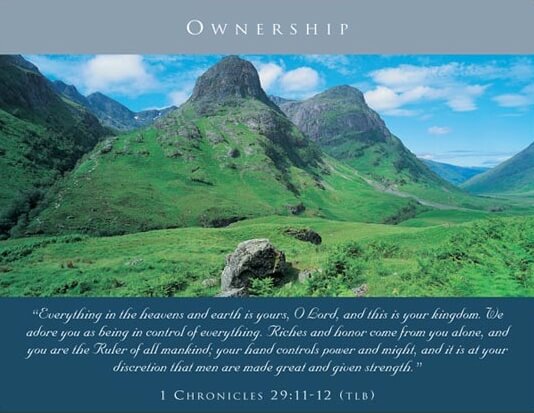Dear Chuck,
I find the conflicting messages among well known preachers and financial experts confusing when it comes to whether I should expect to do well financially if I am in God’s will and following His plan. You turn on the television, and many of the most popular preachers insist that good times are ahead for the faithful. Are they?
Pondering Prosperity
Dear Pondering,
There are a lot of financial teachers, preachers and gurus in the world today! It is good to be skeptical about who you should be listening to as each has a very different financial and biblical philosophy. You are certainly not alone if you are confused. “How much do I deserve?” is a question most people ponder throughout their working life. It’s an age-old concern to really know what you are worth and what to financially expect of or from God.
Rather than a blanket statement that you do or do not deserve riches, the answer from a Christian perspective requires an examination of God’s perspective.
Our True Identity
First, we deserve nothing at all. Romans 6:23 reminds us what we have actually earned: “For the wages of sin is death, but the gift of God is eternal life in Christ Jesus our Lord.”
And yet, God judges that you are worth the very sacrifice of Jesus Christ himself. He offers us all of Himself plus eternal life. In Romans 8:31-32 we read, “If God is for us, who can be against us? He who did not spare his own Son, but gave him up for us all—how will he not also, along with him, graciously give us all things?”

So, our true identity is that of being adopted as God’s child who has such extreme worth that Jesus rescued us from our rightful condemnation under the penalty of our sin by His priceless mercy and grace. But that does not mean we will be materially made rich as some TV preachers might proclaim.
Two Extreme Financial Teachings
Next, there are two extreme financial teachings in Christian camps today: the Prosperity Gospel and the Poverty Gospel. I believe both are wrong.
Those who believe that riches are a sign of God’s blessing advance what is commonly referred to as the Prosperity Gospel. This teaches that you can command God to prosper you financially, that when you give you can expect a larger financial increase in return, and that your spending can be extravagant and carefree. This false theology is in contradiction to the many Scriptural warnings against greed, selfishness, coveting, idolatry, and the love of money.
Luke 16:14-15: “The Pharisees, who loved money, heard all this and were sneering at Jesus. He said to them, “You are the ones who justify yourselves in the eyes of others, but God knows your hearts. What people value highly is detestable in God’s sight.”
First Timothy 6:10: “For the love of money is a root of all kinds of evil. Some people, eager for money, have wandered from the faith and pierced themselves with many griefs.”
You should be on your guard to identify and reject the teachings of the Prosperity Gospel as well as the other extreme, the Poverty Gospel. This false teaching claims that money and possessions are evil, that rich people are greedy and sinful, that being poor makes you more righteous in God’s eyes, and that spending brings guilt and condemnation.
Proverbs 30:8 instructs us not to seek poverty or riches. “Keep falsehood and lies far from me; give me neither poverty nor riches, but give me only my daily bread.”
The Bible never condemns wealth and neither should we. The Bible never upholds poverty as the pathway to righteousness, nor should we.
We can know that the presence or absence of money is not the way we measure God’s blessing. “Rich and poor have this in common: The LORD is the Maker of them all,” notes Proverbs 22:2. In Hebrews 11, often called the Faith Hall of Fame, you can read of heroes and martyrs, rich and poor, who made up the fabric of our Christian history. What made them distinctive were not their bank accounts, but how they used their opportunities to further the work of God on earth and how well they followed through on what God asked of them. In fact, of those who suffered the most, the scripture says in verse 38, “The world was not worthy of them.”
We are Stewards
Many people wonder what the Bible does say about money and possessions if the Prosperity and Poverty theologies are both wrong. The Bible is full of financial wisdom – in fact, over two-thirds of Jesus’ parables involved money! Scripture makes it clear that God is the Owner of all things (Psalm 24:1), that we are His stewards (Matthew 25:14-30) and that we are called to be faithful – regardless if we have a lot or a little (1 Corinthians 4:2). As stewards of God’s money, we are called to work hard, to manage well, to be cheerful givers and to spend cautiously. We will not be judged by the amount we accumulate or by whether or not our peers saw us as successful.
Remember Who Makes the True Judgment of Your Worth
When you are tempted to value your success in dollars, remember what Jesus said in Mark 12 about the woman who gave her last pennies to the work of God. “Truly I tell you, this poor widow has put more into the treasury than all the others. They all gave out of their wealth; but she, out of her poverty, put in everything—all she had to live on.”
Faithful stewardship is not about ordering your finances in a way you can spend whatever you want. It’s about positioning your heart in a way that God can spend you however He wants. God sees your heart and values your gift – not for its size but for the love you show with it.
With a careful financial plan in place, fueled by hard work and discipline, you may achieve more financially than you ever dreamed possible. Or you may be asked to live a life of frugality where God’s strength is revealed in your weakness. Our primary question should not be how much money does God want us to have, but what kind of witness does He want us to be with our resources? Get inspired by the testimony God is building into your life and enjoy the blessings He sends your way.
If you’re looking for a little encouragement in the year ahead, please accept this gift from Crown. You can receive practical principles and daily encouragement from God’s Word in the God is Faithful devotional, sent straight to your inbox to consider what God has to say about our daily life. For a practical tool for organizing your finances, check out Crown’s Money Map.
Originally posted on the Christian Post on May 26
 the Lord your God with all your heart and with all your soul and with all your mind and with all your strength.’ The second is this: ‘You shall love your neighbor as yourself.’ ”
the Lord your God with all your heart and with all your soul and with all your mind and with all your strength.’ The second is this: ‘You shall love your neighbor as yourself.’ ”











 with all your heart, lean not on your own understanding. In all your ways acknowledge Him and He will make straight your paths.” With Christ as your guide, you can avoid dead-end jobs, wasted time, and stressful work environments. Thank Him for the talents and abilities He has given you and magnify Him through your work.
with all your heart, lean not on your own understanding. In all your ways acknowledge Him and He will make straight your paths.” With Christ as your guide, you can avoid dead-end jobs, wasted time, and stressful work environments. Thank Him for the talents and abilities He has given you and magnify Him through your work.

